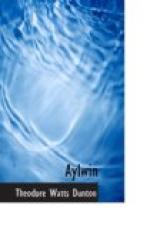Raxton stands on that part of the coast where the land-springs most persistently disintegrate the hills and render them helpless against the ravages of the sea. Perhaps even within the last few centuries the spot called Mousetrap Cove, scooped out of the peninsula on which the old church stands, was dry land. The old Raxton church at the end of this peninsula had, not many years since, to be deserted for a new one, lest it should some day carry its congregation with it when it slides, as it soon will slide, into the sea. But as none had dared to pull down the old church, a custodian had to be found who for a pittance would take charge of it and of the important monuments it contains. Such a custodian was found in Wynne, who lived in the cottage already described on the Wilderness Road. Along this road (which passed both the new church and the old) I was frequently journeying, and Wynne’s tall burly form and ruddy face were, even before I knew Winnie, a certain comfort to me.
He was said to be the last remnant of an old family that once owned much land in the neighbourhood, and he was still the recipient of a small pension. My father used to say that Wynne’s family was even exceptionally good, that it laid claim to being descended from a still older Welsh family. But my mother scorned the idea, and always treated the organist as belonging to the lower classes. It was Wynne who had taught me swimming. It was really he, and not my groom, who had taught me how to ride a horse along the low-tide sands so as not to distress him or damage his feet.
It was about this time that my uncle Aylwin of Alvanley, my mother’s brother, who had quarrelled with her, became reconciled to her, and came to Raxton. He at once recommended that a friend of his, a famous London surgeon, should he consulted about my lameness. I accordingly went with him to London to be placed under the treatment of the eminent man. Had this been done earlier, what a world of suffering might have been spared me! The man of science pronounced my ailment to be quite curable.
He performed an operation upon the leg, and after a long and careful course of treatment in town, advised that I should go to Margate for a long stay, and avail myself of that change of air. I went, accompanied by my mother and brother, and stayed there several months. My father used to come to see us once a month or so, stay for a week, and then go back.
I now wrote another letter to Winifred, and after a long delay, got a reply, but it consisted mainly of descriptions of the way in which she paddled in the Welsh brooks and of lessons in the shawl-dance which she was taking from Shuri Lovell, the mother of her Gypsy friend. So vividly did she describe these lessons that her pictures haunted me. I wrote in reply to this a letter burning with my ever-growing love, but to this I got no reply.
As the surgeon had prophesied, I made such advance that I was after a while able to walk with tolerable ease without my crutches, by the aid of a walking-stick; and as time went on, the tonic effect of Margate air, aiding the remedies prescribed by the surgeon, worked such a change in me that I was pronounced well, and the doctor said I might return home. I returned to Raxton a cripple no longer.




